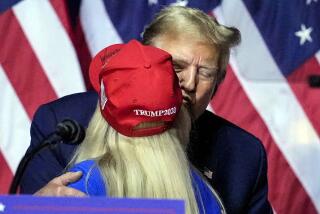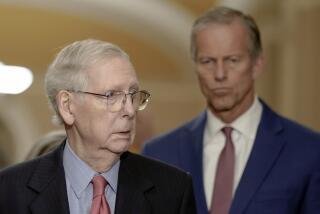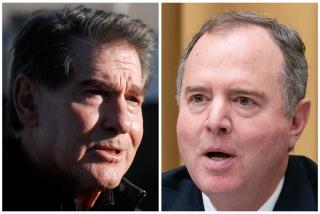Essential Politics: Cozying up to Cruz -- Republican leaders back man they dislike to block one they fear
For most of the 3-1/2 years since he was elected to the Senate, Sen. Ted Cruz has been a man establishment Republicans loved to hate. In February, Sen. Lindsey Graham of South Carolina joked that if someone killed the Texan on the floor of the Senate and the Senate held the trial, no one would be convicted.
A few days ago, Graham held a fundraiser for Cruz. On Wednesday, Jeb Bush endorsed him. Mitt Romney, who had campaigned with Gov. John Kasich in Ohio less than two weeks ago, backed Cruz too, making recorded telephone calls for him in advance of Tuesday’s primary in Arizona and caucuses in Utah.
“At this point a vote for John Kasich is a vote for Donald Trump,” the calls said.
Good afternoon, I’m David Lauter, Washington Bureau chief. Welcome to the Friday edition of our Essential Politics newsletter, in which we look at the events of the week in the presidential campaign and highlight some particularly insightful stories.
This week, we’ll also reveal a key number from our latest USC Dornsife/Los Angeles Times poll of California voters. Read on for that, and check on Sunday for the first stories about the poll’s findings at our politics page and on Twitter at @latimespolitics.
Maybe Romney’s backing helped in Utah, where Cruz took almost 70% of the vote on Tuesday even as he lost Arizona to Trump. Or maybe the results there just testify to the fact that Mormons have joined Latinos, blacks, young people and Democrats on the list of groups who deeply dislike the blustery New York businessman.
In Arizona, meanwhile, Trump appears to be helping Democratic activists in their efforts to make the state blue, or at least a bit more purple, by increasing the number of Latino registered voters, as Seema Mehta described.
This week’s flurry of endorsements for Cruz represented the latest effort by established figures in the GOP to try to slow Trump down before he can win the 1,237 delegates he would need for a first-ballot victory at this summer’s Republican nominating convention.
The strategy seems designed to pressure Kasich to quit the race, lest he split the anti-Trump vote. So far, the Ohio governor has been brushing aside such pleas, arguing that he can defeat Hillary Clinton in the November general election, which he says neither Trump nor Cruz can do.
Trump, of course, claims he is bringing “millions” of new voters into the GOP. The evidence so far shows that’s not so, as I explained in this piece on four myths of the 2016 campaign.
The next major test in the GOP race won’t come for a week and a half, April 5, when Wisconsin holds its primary.
Kasich thinks he can do well in the state, which demographically resembles Ohio. But Wisconsin Gov. Scott Walker doesn’t seem to think so.
“Ted Cruz is the only one who’s got a chance other than Donald Trump to win the nomination statistically, and my friend Gov. Kasich cannot,” he said in a radio interview. Walker added that he would probably make an endorsement sometime next week, to have maximum impact on the primary.
You can follow the outcome of all the primaries, as we post live results, speeches and analysis on Trail Guide.
And as the race unfolds, keep watch on the delegates in both parties with our Delegate Tracker, which shows where each candidate stands and where they have won support.
Over in the Democratic race, this weekend will see three caucuses, in Alaska, Hawaii and Washington, with the latter attracting the greatest attention. Seattle has been one of the leading sources of contributions to Sen. Bernie Sanders, and as Chris Megerian explains, the state’s caucuses have become a must-win contest for him after he spent heavily in an unsuccessful effort to beat Hillary Clinton in Arizona.
Sanders has openly begun to concede that his campaign has only a “narrow” path to a potential victory. Any hope he does have hangs on the caucus outcomes. Even if he wins there, however, and in Wisconsin in April, the math of the delegate contest makes a Sanders victory extremely unlikely.
With both Sanders and Clinton campaigning in California over the past few days, Cathy Decker took a look ahead at why winning the state won’t be easy for the insurgent Vermont senator, who would need to carry the state in a landslide to amass enough delegates to win the nomination.
Sanders talked to Times editors and editorial writers this week about the importance his campaign places on California and his view of the issues. We’ve posted a full transcript of the interview.
“Look, I come from a state which has 630,000 people. And I know half the people in my state. California is not Vermont; it’s an entirely different world for us, and it is a little bit intimidating,” he said.
By the way, the belief by many Sanders backers that Clinton’s lead only involves the so-called super-delegates, who are not chosen by primary voters, is another of the campaign myths I examined in the piece I mentioned earlier.
Clinton is already looking ahead at the general election. As Evan Halper wrote, she did not even mention Sanders during a speech on foreign policy at Stanford University, in which she blistered Trump and Cruz.
Trump, by contrast, has done little to modulate his appeal for a potential general election audience, as Michael Finnegan and Mark Z. Barabak reported from Arizona.
His language and personality trouble many Republican voters, even some of Trump’s supporters -- doubts that were on full display during a focus group of Republican voters in St. Louis that reporters were able to watch. Here’s my account of the group’s reactions to the GOP front-runner.
Halper took a look at what may be the biggest legacy of Sanders’ campaign: He’s turned a formerly obscure left-wing fundraising operation, ActBlue, into the political world’s greatest money machine.
Finally, the fight over the Supreme Court nomination of Judge Merrick Garland continues to roil Capitol Hill.
Lisa Mascaro went to Pennsylvania, where Sen. Pat Toomey faces a difficult reelection fight, to look at the efforts by Democrats and their allies to put pressure on Republicans to give Garland a hearing.
Mascaro also did this helpful rundown of the 13 Senate seats -- 11 held by Republicans and 2 by Democrats -- that are potentially at risk in this year’s elections.
Mike Memoli looked at how the fight over Garland is also becoming a battle between Senate Majority Leader Mitch McConnell and a former chairman of the Senate Judiciary Committee, Vice President Joe Biden.
And David Savage reported on the latest from the Supreme Court, where the remaining eight justices seem deadlocked on the issue of the Obamacare requirement that insurance plans offer contraceptive coverage to women. Savage’s piece explains the issue and the ramifications of what appears to be a 4-4 split.
The poll:
We’ll have a lot more results from our poll of California voters over the next several days. But here’s a first glimpse at one key number -- President Obama’s approval rating in the state, which has risen to 64%, the highest level the poll has found going back to his first year in office. Similarly, the share of Californians viewing Obama favorably, 65%, is also at a high point.
The upsurge in positive views of Obama has showed up nationwide in several recent surveys, although he’s starting from a lower base in more Republican parts of the country. That could matter for the general election since the party in power benefits when voters have a positive view of the incumbent.
That wraps up this week. My colleague Christina Bellantoni will be back Monday with the weekday edition of Essential Politics. Until then, keep track of all the developments in the 2016 campaign with our Trail Guide at our politics page and on Twitter at @latimespolitics.
Send your comments, suggestions and news tips to politics@latimes.com.
More to Read
Get the L.A. Times Politics newsletter
Deeply reported insights into legislation, politics and policy from Sacramento, Washington and beyond. In your inbox three times per week.
You may occasionally receive promotional content from the Los Angeles Times.







